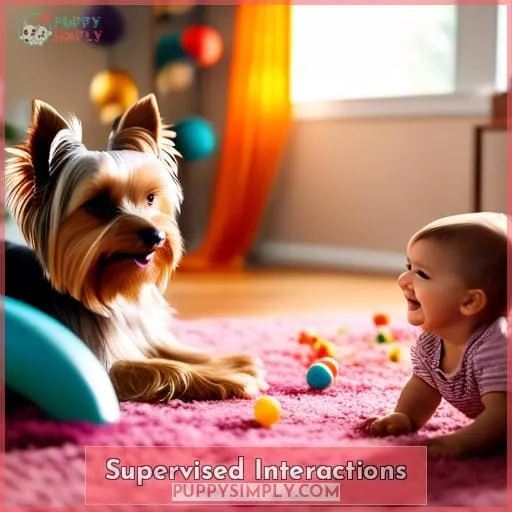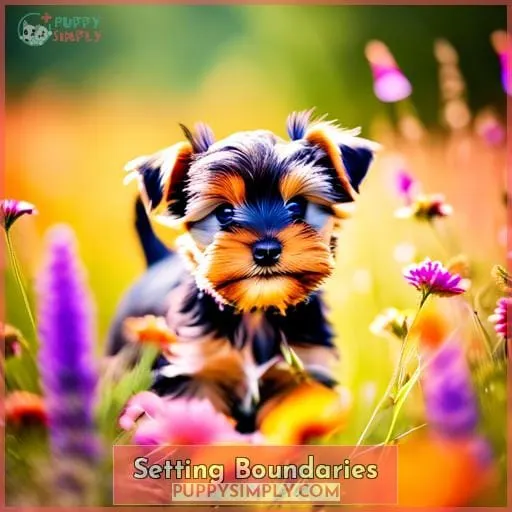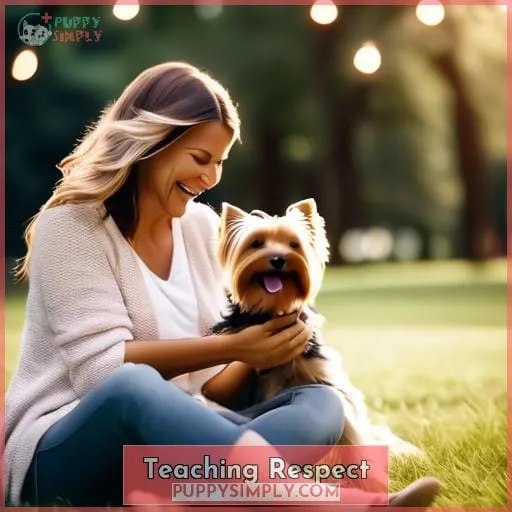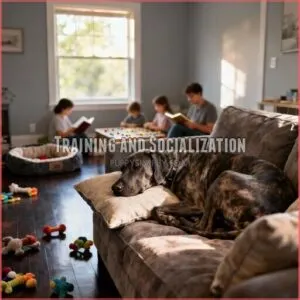This site is supported by our readers. We may earn a commission, at no cost to you, if you purchase through links.

But are these pint-sized pups a good fit for your family?
Only you know your brood best, but here’s a parent’s guide to help answer the question: are Yorkshire Terriers kid-friendly?
Table Of Contents
- Key Takeaways
- Yorkshire Terriers and Children
- Supervised Interactions
- Setting Boundaries
- Teaching Respect
- Size Matters
- Energy Levels
- Training and Socialization
- Choosing the Right Yorkshire Terrier
- Frequently Asked Questions (FAQs)
- How do I introduce my Yorkshire Terrier to my children for the first time?
- Are there any specific safety precautions I need to take when my Yorkshire Terrier is around my children?
- What are some common challenges that arise when raising a Yorkshire Terrier with children and how can I overcome them?
- How can I teach my children to interact with my Yorkshire Terrier in a respectful and safe manner?
- Are there any specific activities or games that I can engage in with my Yorkshire Terrier and my children to strengthen their bond?
- Conclusion
Key Takeaways
- Supervised interactions are essential for a harmonious and safe environment between Yorkshire Terriers and children.
- Setting clear boundaries and teaching children proper handling techniques can help prevent aggression and anxious behavior in Yorkshire Terriers.
- Teaching children to respect the dog’s space and belongings, and to recognize signs of stress, can help prevent misbehavior and ensure a positive relationship between the dog and the child.
- The size difference between a Yorkshire Terrier and a child should be considered when choosing a dog and teaching children how to interact with it safely.
Yorkshire Terriers and Children
As a parent, you’re likely concerned about how your Yorkshire Terrier will interact with your children.
Affectionate and spirited, Yorkies can make wonderful companions for families.
However, their small size and feisty temperament can pose challenges.
Yorkies are terriers, bred to hunt and kill rodents. This means they have a strong prey drive and can be aggressive towards small animals.
They also have a tendency to bark excessively, which can be a nuisance.
Additionally, Yorkies can be anxious and easily stressed, which can lead to biting or other aggressive behaviors.
But with proper socialization, training, and supervision, Yorkies can learn to be gentle and loving companions for children.
Supervised Interactions
Supervising interactions between Yorkshire Terriers and children is essential to ensure a harmonious and safe environment.
Always keep an eye on them, especially during playtime.
Teach your children how to approach and pet the dog gently, avoiding sudden movements that could startle it.
Establish Common Ground:
Find activities that both kids and Yorkies enjoy, such as playing fetch or going for walks. This creates a sense of camaraderie and strengthens the bond between them.
Family Bonding:
Encourage your children to participate in grooming and feeding the Yorkshire Terrier. This fosters a sense of responsibility and nurtures empathy towards animals.
Healthy Socialization:
Supervised interactions help the Yorkshire Terrier learn how to behave appropriately around children. It also teaches your kids how to interact respectfully with animals, setting the stage for future healthy socialization with other pets and people.
Safety Precautions:
Teach your children never to disturb the Yorkshire Terrier while it’s eating or sleeping.
Setting Boundaries
To shape well-behaved Yorkies and ensure child safety:
- Set clear boundaries on acceptable behaviors through consistent discipline and positive reinforcement.
- Establish house rules that apply to both kids and Yorkies, like no jumping on furniture or begging at the table.
- Teach children proper handling techniques and supervise interactions to prevent rough play or accidents.
Create a family structure where the Yorkie is a beloved pet sibling, not a toy or a substitute for a child:
- Ensure kids understand the dog’s needs and boundaries, promoting empathy and respect.
- Implement safety measures like gates to separate the dog from high-traffic areas or small children during playtime.
- Manage expectations; Yorkies are affectionate and playful, but they also need alone time and quiet spaces to retreat to.
Teaching Respect
Teach your kids to respect the dog’s space and belongings, and to always ask before petting or playing.
Explain that the dog needs its own quiet place to rest and recharge, and that its toys and food are off-limits.
This will help prevent the dog from feeling overwhelmed or possessive, and it will also teach your kids to be respectful of animals.
Enforce Gentle Interactions:
- Instruct your kids to approach the dog calmly and gently, avoiding sudden movements or loud noises.
- Emphasize the importance of petting the dog softly and asking permission before picking it up.
Teach Proper Play:
- Show your kids how to play with the dog in a way that’s safe and enjoyable for both parties.
- Encourage interactive activities like fetch or tug-of-war, and supervise play sessions to prevent roughhousing or accidents.
Respect the Dog’s Boundaries:
- Teach your kids to recognize signs that the dog is feeling overwhelmed or stressed, such as growling, barking, or avoiding eye contact.
- Instruct them to give the dog space and allow it to retreat to its safe place.
Set Consequences for Misbehavior:
- Establish clear rules and consequences for any misbehavior towards the dog.
- This could include a timeout, loss of privileges, or having to apologize to the dog.
- Consistency and fairness are key to teaching your kids to respect the dog and its boundaries.
Size Matters
As a responsible dog owner, you’ll need to consider the substantial size difference between a Yorkshire Terrier and a child.
Yorkies are tiny dogs, typically weighing between 3 and 7 pounds, while children are much larger and stronger.
This size difference can lead to safety concerns, especially for younger children who may not be gentle with the dog.
A rambunctious toddler could easily injure a Yorkie by accidentally stepping on it or squeezing it too tightly.
When considering a Yorkshire Terrier for your family, it’s crucial to choose a dog that’s the right size for your children.
A puppy or a smaller Yorkie may be a better choice than a larger adult dog.
You’ll also need to make sure that your children are taught how to interact with the dog safely and respectfully.
Energy Levels
The petite size of a Yorkshire Terrier doesn’t mean they’re couch potatoes.
These lively pups have boundless energy and require daily exercise to stay happy and healthy.
As a responsible pet parent, it’s your duty to meet their exercise needs.
Daily Exercise:
- Aim for at least 30 minutes of moderate exercise each day.
- This can include brisk walks, games of fetch, or running around in a fenced yard.
Indoor Exercise Ideas:
- If you live in an apartment or don’t have access to a yard, there are plenty of ways to give your Yorkie exercise indoors.
- Try interactive toys, indoor agility courses, or even treadmill workouts.
Leash Training Methods:
- Teach your Yorkie to walk properly on a leash from an early age.
- This won’t only make walks more enjoyable, but it will also keep your pup safe when you’re out and about.
Common Behavior Problems:
- Address common behavior problems like housebreaking and barking as soon as they arise.
- Consistent training and positive reinforcement are key to raising a well-behaved Yorkie.
Training and Socialization
To ensure harmonious coexistence between your Yorkshire Terrier and children, providing obedience training and early socialization is key.
Enroll your Yorkshire Terrier in obedience classes to teach basic commands and instill good manners. This training will help your dog understand its place in the family and respond appropriately to your commands.
Additionally, introduce your Yorkshire Terrier to a variety of people, animals, and environments through socialization classes. This exposure will help your dog become comfortable in different situations and less likely to exhibit fearful or aggressive behavior.
Training and Socialization Activities:
Playtime Activities:
- Engage in interactive play sessions using safe toys.
- Strengthens bond, provides mental stimulation, releases pent-up energy.
Dedicate 15-20 minutes daily for playtime.
Positive Reinforcement:
- Reward good behavior with treats, praise, or petting.
- Encourages desired behaviors, builds trust and rapport.
Use treats or praise immediately after the desired behavior occurs.
Obedience Training:
- Enroll in classes or follow online tutorials.
- Teaches basic commands, instills discipline, prevents problem behaviors.
Start training early, be patient, consistent, and use positive reinforcement.
Socialization Classes:
- Expose your Yorkshire Terrier to various people, animals, and environments.
- Helps your dog become comfortable in different situations, reduces fear and anxiety.
- Find puppy socialization classes or organize playdates with other dogs.
Choosing the Right Yorkshire Terrier
When selecting a Yorkshire Terrier, consider your family’s lifestyle and activity level to ensure a compatible match.
Seek a breeder who prioritizes temperament and health, and choose a puppy that exhibits a friendly, playful, and confident demeanor.
Opt for a larger Yorkshire Terrier, as they tend to be more sturdy and less prone to health issues compared to their smaller counterparts.
Selecting Suitable Yorkshire Terrier
When choosing a Yorkshire Terrier for a family with children, consider selecting one with a calm and gentle temperament.
Ask the breeder about the health history of the puppy’s parents and avoid show coats that require excessive grooming.
Consider the delicate physique and potential health issues of the breed before making a decision.
While Yorkshire Terriers are hypoallergenic, their hunting instinct may make them unsuitable for homes with small pets.
Temperament and Behavior Expectations
Choosing a Yorkshire Terrier with a temperament suitable for your family’s lifestyle is key to a harmonious household.
Look for Yorkies with a patient, friendly nature who enjoy interacting with people of all ages.
Avoid dogs with signs of anxiety or aggression, as these behaviors can worsen around children.
Additionally, be mindful of health concerns common to the breed, such as respiratory issues and joint problems.
Yorkshire Terrier Size Considerations
Considering Yorkshire Terrier size is important when selecting a suitable dog for your family.
Teacup Yorkshire Terriers, weighing less than 3 pounds, are fragile and prone to health issues, making them unsuitable for homes with rambunctious children.
Aim for Yorkies weighing 4 pounds and up, as they’re more robust and can better withstand the roughhousing that often comes with family life.
| Yorkshire Terrier Weight | Suitability for Families with Kids | Additional Considerations |
|---|---|---|
| Teacup (less than 3 pounds) | Not suitable | Fragile, prone to health issues, easily injured |
| Toy (3-7 pounds) | Suitable with caution | More robust than Teacups, but still delicate |
| Standard (7-8 pounds) | Most suitable | Sturdy and playful, can withstand roughhousing |
| Oversized (more than 8 pounds) | Suitable with caution | May be too big for small children to handle |
Frequently Asked Questions (FAQs)
How do I introduce my Yorkshire Terrier to my children for the first time?
When introducing your Yorkshire Terrier to children, start by having them sit quietly together.
Let your dog sniff the child’s hand and gradually move closer.
Supervise their interactions and teach both parties gentle behavior.
Are there any specific safety precautions I need to take when my Yorkshire Terrier is around my children?
Teach children proper handling techniques:
- Gentle petting
- No pulling on ears or tail
This will prevent accidental injuries to your petite pup.
What are some common challenges that arise when raising a Yorkshire Terrier with children and how can I overcome them?
Overcoming challenges with raising a Yorkshire Terrier and children involves:
- Setting boundaries.
- Teaching respect.
- Providing supervised interactions.
Consistency and patience are key to creating a harmonious household.
How can I teach my children to interact with my Yorkshire Terrier in a respectful and safe manner?
With patient guidance, teach your children to:
- Approach your Yorkshire Terrier gently.
- Avoid pulling its tail or ears.
- Respect its personal space.
Model kind behavior and supervise interactions to ensure a harmonious relationship.
Are there any specific activities or games that I can engage in with my Yorkshire Terrier and my children to strengthen their bond?
Engage your Yorkshire Terrier and children in interactive games:
- Fetch
- Hide-and-seek
- Obstacle courses
These games reinforce their bond and create lasting memories.
Conclusion
Did you know that a study by the American Kennel Club found that 82% of Yorkshire Terrier owners reported that their dogs are great with kids?
If you’re considering adding one of these adorable pups to your family, it’s important to remember that while they can be wonderful companions, they also require careful supervision and training to ensure the safety of both your children and your pet.
By following the tips outlined in this guide, you can help create a harmonious and loving relationship between your Yorkshire Terrier and your kids, making them the best of friends for years to come.














